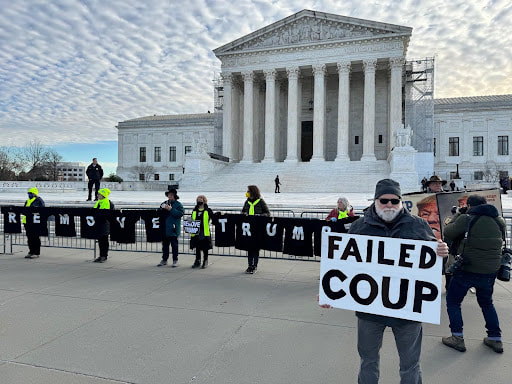|
Donald Trump is restored to the Colorado ballot in an unprecedented case. Image c/o Chase Woodruff/Colorado Newsline By Anthony Romero News Reporter On March 4th, the Supreme Court ruled that states may not disqualify former President Donald Trump from running in the upcoming presidential election. The judgment was announced before the Super Tuesday primaries and ultimately rejected challenges made by legislative officials in Colorado, Maine, Illinois, and other states that sought to remove Trump from their presidential primary ballots. The Colorado Supreme Court came to its decision by citing Section 3 of the 14th Amendment, which explicitly disqualifies government officials from running for public office after engaging in insurrectionist behavior. Colorado’s justices purported that Trump’s attempts to overturn the results of the 2020 presidential election resulted in the January 6th riots on the Nation’s Capital, making him ineligible to run for president. “We do not reach these conclusions lightly,” wrote the Colorado Court’s majority. “We are mindful of the magnitude and weight of the questions now before us. We are likewise mindful of our solemn duty to apply the law, without fear or favor, and without being swayed by public reaction to the decisions that the law mandates we reach.”
Section 3 of the 14th Amendment traces its origins back to the post-Civil War Reconstruction Era, acting as a legislative effort to address former Confederates who held office. A criminal conviction in this context is not necessary to enforce the provision, and Congress has historically refused to seat members under this clause. In the March 4th decision, all nine justices were in agreement, and the unsigned majority opinion of the court cited that this constitutional power resides with Congress instead of the states. Although states may use Section 3 to address dubious candidates running for state office, they do not have the same authority to enforce this law against candidates for national office. If states were allowed to disqualify federal government officials, an increase in disagreements regarding the eligibility of prospective leaders would threaten the stability of the relationship between the federal government and the people of the United States. Despite all justices reaching the same conclusion, there were some distinctions in their written statements, none directly addressing Trump’s actions as outright insurrection. Five of the Conservative justices (Chief Justice John Roberts and Justices Clarence Thomas, Samuel Alito, Neil Gorsuch, and Brett Kavanaugh) completely agreed with the majority opinion that Section 3 does not qualify states with the power to remove a federal official or candidate. In addition, they also concurred that Congress would need to develop legislation that creates an “enforcement mechanism” to enact the terms of the Fourteenth Amendment. This call for additional Congressional legislation was opposed by the three liberal justices (Justices Sonia Sotomayor, Elena Kagan, and Ketanji Brown Jackson) as they saw the Court’s legal jurisprudence as excessive and would only serve to shut the door on other potential methods of enforcement. The three Justices agreed with the majority opinion that Section 3 is reserved for Congress, but they urged the Court to practice judicial restraint when proposing to make decisions on matters that extend beyond this specific case. Justice Amy Coney Barrett made a distinctive stance by separating herself from both factions in her concurring opinion. Justice Coney Barrett agreed with the liberal Justices’ claim that the Colorado Supreme Court’s majority opinion overreached in suggesting additional federal legislation to enforce the disqualification provision. However, she questioned the liberal Justices’ tone and suggested that her fellow Justices not amplify their disagreement with the majority opinion. Justice Barrett stated the significance of the Court’s decision on this controversial issue, emphasizing that the unanimous agreement should serve to quell tensions in the nation, not to incur further polarization. “For present purposes,” she wrote in her opinion, “our differences are far less important than our unanimity: All nine justices agree on the outcome of this case. That is the message Americans should take home.”
0 Comments
Leave a Reply. |
StaffMadison Sciba '24, Archives
November 2023
Categories |


 RSS Feed
RSS Feed